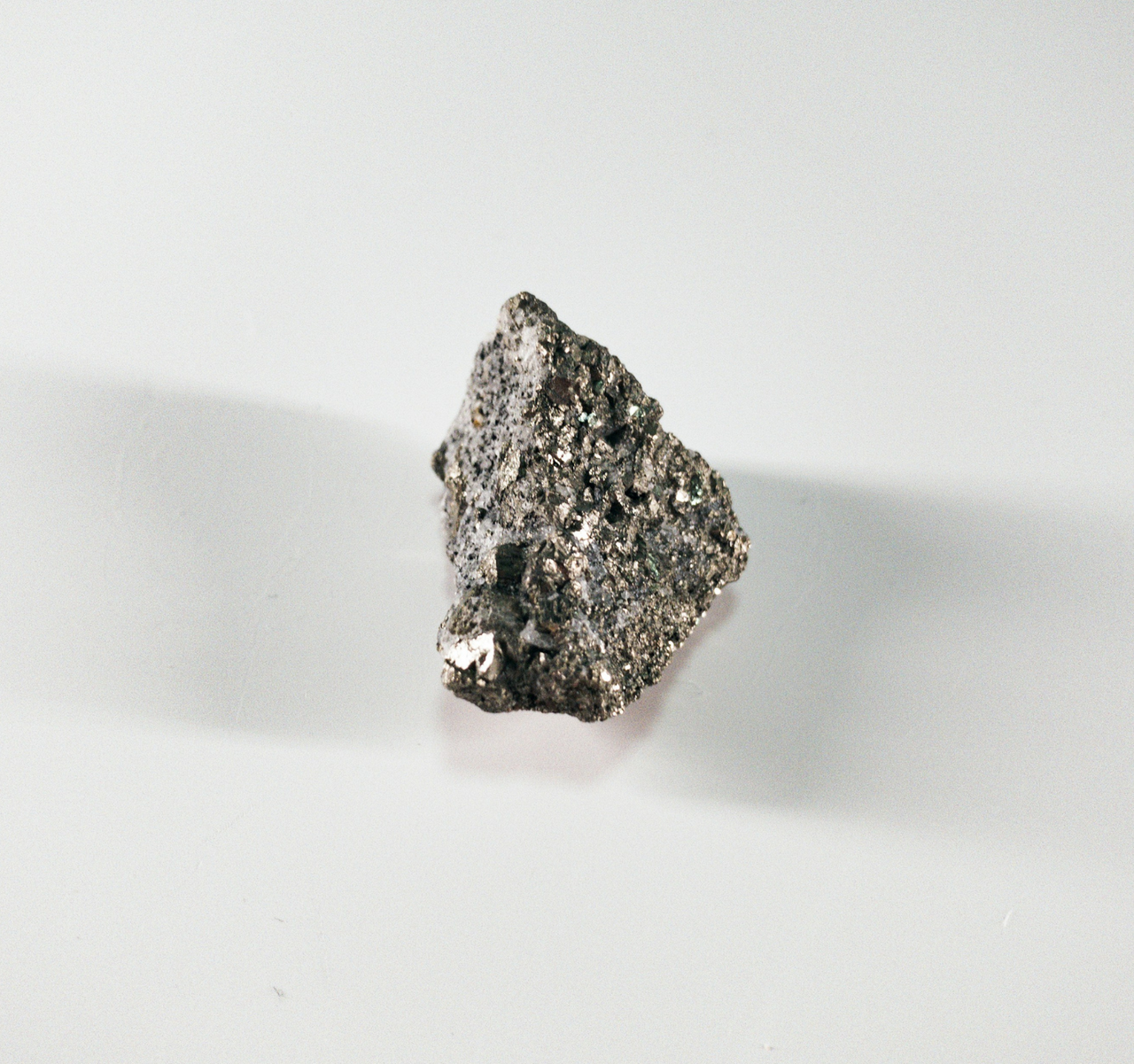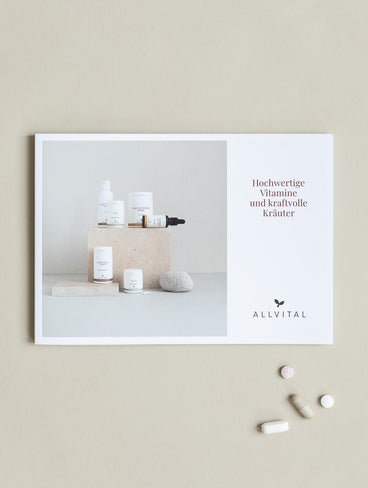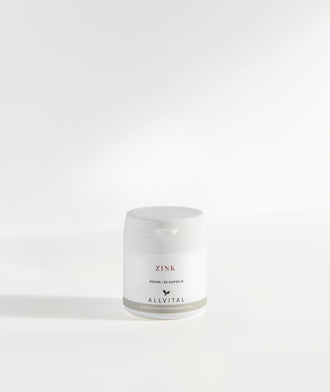
The trace element zinc in focus
Zinc performs a wide range of functions in the human body, and a deficiency may be associated with symptoms such as frequent fatigue, susceptibility to infections, skin problems, infertility, or difficulty concentrating.
What is zinc?
Zinc is an essential trace element, meaning the body cannot produce it on its own and relies on regular intake through the diet. Although the total zinc content in the body is relatively low (approximately 2 to 4 g in adults), zinc is involved in over 300 enzymatic reactions. It is present in almost all body cells, especially in the skin, hair, nails, liver, bones, and immune system.
Zinc acts as a so-called cofactor in biochemical reactions. A cofactor is a helper molecule required for enzymes to function. Every reaction in the metabolism is regulated by enzymes, but without the appropriate cofactor, these enzymes cannot work.
Key functions of zinc at a glance
Below, we highlight some of the most important roles of zinc in the body. In reality, this trace element contributes to many more physiological processes.
Immune system support
Zinc is indispensable for a strong immune response. It supports the development of immune cells, regulates inflammatory processes, and has antimicrobial effects. Zinc deficiency increases susceptibility to infections, particularly of the respiratory tract. Zinc is also effectively used in the treatment of colds and viral infections—provided it is taken early and in adequate doses.
You can learn more about supporting your immune system in our blog post “Naturally boosting the immune system”.
Zinc for skin, hair, nails, and wound healing
Zinc promotes cell division and thus supports the renewal of the epidermis, hair, and nails. It also contributes to the production of collagen, the most important structural protein in the skin and connective tissue. Zinc is also essential for wound healing, as it supports tissue regeneration and strengthens the immune system in defending against pathogens.
You’ll find more on nutrients for skin health in our article "Beauty from within: nutrients for skin, hair & nails".
Fertility and hormonal balance
Zinc plays a vital role in hormonal health - for both men and women. It is essential for the production of testosterone and sperm and also influences thyroid function and the female menstrual cycle. A zinc deficiency may therefore affect libido, fertility, and hormonal balance.
Macronutrient metabolism and blood sugar regulation
Zinc is involved in the metabolism of carbohydrates, fats, and proteins. It activates enzymes needed to break down nutrients and helps regulate blood sugar levels. Zinc is also important for insulin production and sensitivity - particularly relevant for individuals with prediabetes or diabetes.
Antioxidant and cellular protection
Zinc functions as an antioxidant: it protects cells from free radicals, stabilizes cell membranes, and supports the body’s natural detoxification processes. It also contributes to DNA repair and healthy aging.
Zinc for cognitive function and mental health
Zinc influences concentration, memory, and emotional stability. It plays a role in regulating neurotransmitters such as serotonin and dopamine, which are essential for mood and motivation.
How much zinc do you need per day?
The daily zinc requirement depends on several factors - such as age, sex, health status, and, in particular, the composition of your diet.
A major factor is the presence of anti-nutrients - compounds in food that reduce mineral absorption in the intestines. The most well-known is phytic acid, found primarily in whole grains, legumes, nuts, and seeds. In plants, phytic acid binds phosphorus in the form of phytates, but in the human digestive system, phytates can also bind zinc and other minerals such as iron, magnesium, and calcium - reducing their bioavailability.
The higher the daily phytate intake, the lower the bioavailability of zinc, and the more must be consumed to meet the body's needs.
The German Nutrition Society (DGE) provides phytate-dependent recommendations (as of July 2025):
- Men: 11 mg/day (low phytate intake) to 16 mg/day (high phytate intake)
- Women: 7 mg to 10 mg/day
Other anti-nutrients that inhibit zinc absorption
Besides phytates, other substances in food may impair zinc absorption:
- Tannins: Found especially in black and green tea, coffee, red wine, and some berries (e.g., blueberries). Tannins bind zinc in the gut and reduce its absorption.
- Oxalic acid: Found in spinach, rhubarb, Swiss chard, beets, sorrel, and chocolate. Oxalic acid can bind zinc, calcium, and magnesium, limiting their absorption.
- Calcium and iron: When taken in large quantities (e.g., as supplements), these minerals can compete with zinc for the same intestinal transport mechanisms and hinder its uptake.
When zinc needs are increased
Even aside from anti-nutrient intake, zinc requirements can be significantly elevated in various situations, such as:
- Chronic stress
- Intense physical activity
- Pregnancy and lactation
- Digestive disorders
- HPU (hemopyrrollactamuria)
- Liver and kidney diseases
Zinc status – why testing can help
To determine whether your zinc levels are adequate - or whether you have an increased requirement - it is advisable to regularly monitor your zinc status via blood tests, ideally using a full-blood mineral analysis. This approach helps identify both deficiencies and excesses early and allows for targeted intervention before symptoms appear.
Zinc in foods
Zinc is found in both animal and plant-based foods. Particularly rich sources include:
- Animal-based: Beef, liver, eggs, cheese, seafood (especially oysters)
- Plant-based: Oats, legumes, pumpkin seeds, nuts, whole grains
Because plant foods contain phytates, the bioavailability of zinc is much higher from animal-based sources. Additionally, dietary protein supports zinc absorption.
For those following a primarily plant-based diet, zinc absorption can be improved through proper food preparation techniques:
- Soaking and sprouting: Soaking legumes, seeds, and nuts can reduce phytate content and improve mineral bioavailability.
- Fermentation: Natural fermentation, such as in sourdough bread, breaks down phytates and enhances zinc uptake.
- Cooking: Cooking also slightly reduces the phytate content, especially when combined with prior soaking. It also lowers the level of oxalic acid. The cooking water should be discarded, as oxalic acid is released into the water.
Symptoms of zinc deficiency
Zinc deficiency often develops gradually and may go unnoticed at first. Since zinc is involved in numerous metabolic processes, a deficiency can manifest in various ways. Common symptoms include:
- Frequent infections
- Fatigue, difficulty concentrating
- Skin problems (e.g., acne, eczema, poor wound healing)
- Brittle nails, hair loss
- Mood swings or depressive symptoms
- Impaired sense of taste and smell
Zinc as a dietary supplement: What to look for
To meet zinc requirements or cover short-term increases in need (e.g., during a cold or while breastfeeding), dietary supplements can be helpful. However, the type of zinc compound plays a critical role in how well the body can absorb it.
Highly bioavailable organic zinc compounds include:
- Zinc picolinate
- Zinc citrate
- Zinc gluconate
- Zinc bisglycinate
- Zinc orotate
By contrast, inorganic forms such as zinc sulfate or zinc oxide - often found in cheaper supplements - are less bioavailable and may be harder on the stomach.
Ideally take zinc at least 30 minutes before or 3 hours after a meal. If you have a sensitive stomach, zinc can be taken with food. Just avoid foods high in phytates, oxalic acid, or tannins around the same time.
For long-term supplementation, blood levels should be monitored to prevent excessive intake. Too much zinc can lead e. g. to copper deficiency and may weaken the immune system.
Allvital’s zinc products
Our Zinc supplement combines three well-tolerated, highly bioavailable organic zinc compounds: zinc gluconate, zinc picolinate, and zinc citrate. Each capsule contains 25 mg of elemental zinc.
Zinc is also included in our Immun Power Up supplement. Here, it is combined with other antioxidants and Humicin , a natural substance known to bind heavy metals in the digestive tract. This makes Immun Komplex ideal for supporting a healthy immune system.


